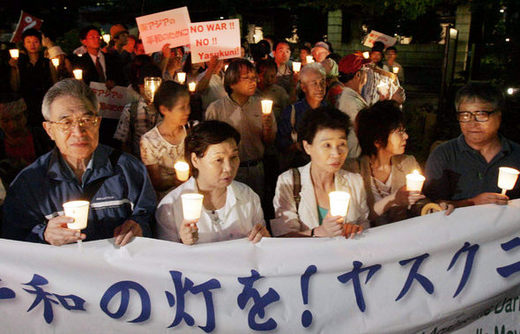 |
|
Some 1,000 activists hold a candlelight vigil near Yaskuni Shrine in Tokyo, Japan, on August 13.
|
Japanese prime minister slated to visit controversial war memorial
Families of South Korean war victims enshrined at Yasukuni Shrine near Tokyo, a place which also commemorates Class-A war criminals, raised their voices in opposition to another impending visit to the shrine by Japanese prime minister Junichiro Koizumi. On the afternoon of August 13, Lee Geum-ju, chairman of a committee of families of World War II victims, said, "After two years of marriage, my husband was forcibly enlisted to Japan, leaving behind his eight-month-old son; my husband died 27 months later. He was never the kind of person who would sacrifices his life for an aggressive war, abandoning his family and his homeland for the Japanese emperor." "It is humiliating [to the memory of] my husband to enshrine him at Yasukuni" and worship him as a hero in a war "against humanity," she continued.Tens of thousands of South Koreans were made to serve in the military for the Japanese, along with nearly 200,000 Asian women, the majority of them Korean, forced into sexual slavery for the Japanese armed forces. On August 13, citizens of South Korea and Japan - along with Taiwan, another country which suffered under Japan during WWII - held a candlelight vigil near the shrine to protest Prime Minister Koizumi’s intended visit, expected on or around August 15. At a speakers’ session that day, a professor of Tokyo University sharply criticized Japan for seeking a restoration of its militarism instead of reflecting on its past atrocities. Park Bo, a Korean-Japanese singer, and an art troupe from Taiwan performed at the protest. The vigil continued with the multi-national ’Korean Committee of Anti-Yasukuni Joint Counteraction’ lighting candles near Yasukuni Shrine at 7:30 in the evening. The demonstrators criticized Koizumi’s plan to visit Yaskuni and urged him to cancel his visit. Members of South Korean and Taiwanese civic groups, families of victims who were forcibly mobilized, and a large number of Japanese citizens took part in the demonstration. While there were no physical clashes between the police and rally participants, demonstrators were met with opposition from extreme-right organizations. At the earlier speakers’ session, right-wing groups obstructed South Koreans who attempted to enter the event hall, spouting rhetoric from a loudspeaker-equipped vehicle. Beside the shrine where the candlelight vigil was held, members of extreme groups chanted, "Don’t intervene in domestic policy!" and attempted to stop the vigil.






